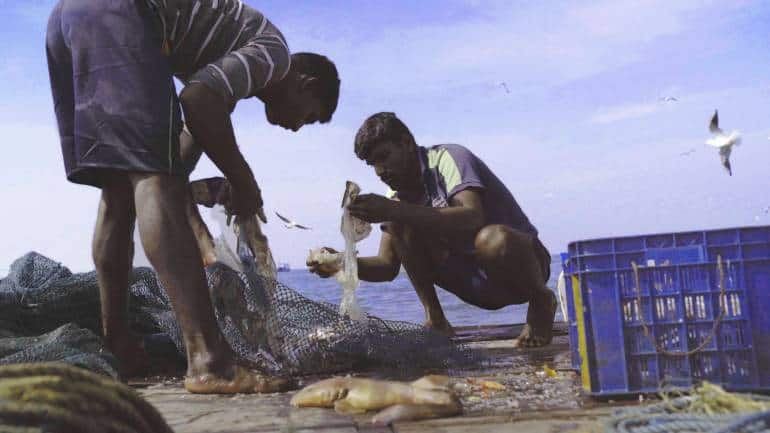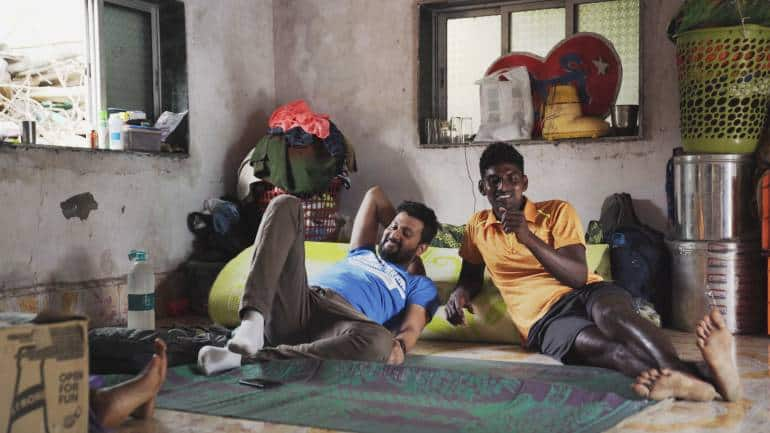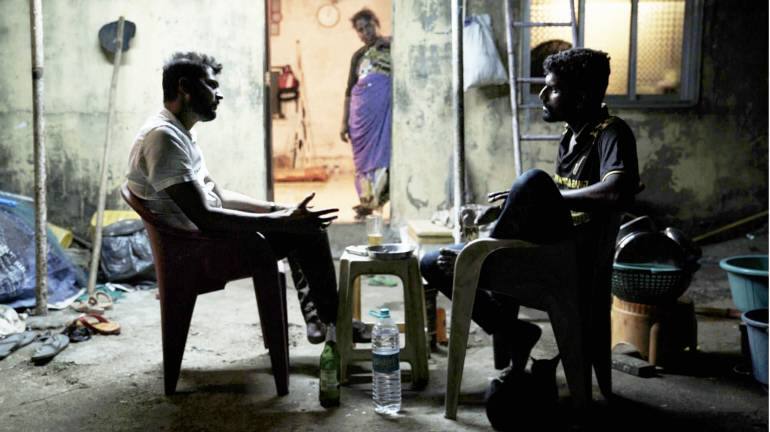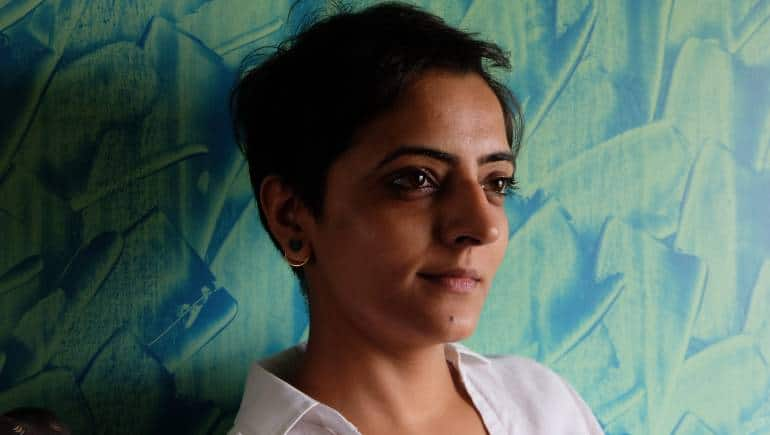



In 2019, filmmaker Sarvnik Kaur got a call from Ganesh Nakhawa, one of the protagonists of her new documentary, and the man behind 'The Last Fisherman Of Bombay' fisheries. Ganesh had got intelligence. “A lot of Kolis work with the Intelligence people since the (2008) Bombay attacks,” says Sarvnik, 39. Ganesh informed her that 10 Chinese vessels had been parked in the Dabhol Creek owing to a cyclone, but “what the heck were they doing in Indian waters?”
Once there, they found a huge boat, perhaps, 10-20 times bigger than Ganesh’s. Then appeared 10 of those. In they climbed to see 37 crew members (the roster listed 40) whose passports had expired and they hadn’t gone home in five years. The crew included Indonesians and Filipinos, mostly from the poorer Southeast-Asian countries, employed by some Chinese fishing company which did not exist on papers. A mother vessel would travel once a month.
“These guys are fishing day in and day out,” she adds, “They had every fishing technology on their boats, each with about 100-tonne capacity. And there are multiple such boats in the Arabian Sea. Ganesh sees it on the satellites, but who’s giving them (Chinese vessels) permission, how come they are in our national waters? Nobody’s talking about it, someone is certainly benefitting very deeply from all of it. Ganesh has been struggling to prove this for a very long time, but the story didn’t come out.”
Sarvnik Kaur's Against the Tide has won eight awards till now, including the Special Jury Award for Vérité Filmmaking in World Cinema Documentary at the prestigious Sundance Film Festival in January. It is the third Indian documentary to win in this category in a row and, perhaps, like the previous two Oscar-nominated Writing with Fire (2021) andAll That Breathes (2022), Indian documentary film might get third time lucky at the Academy Awards. It has also won the UN Perception Change Award at Visions du Réel 2023 and is nominated for Asia Pacific Screen Award (APSA). It is the only documentary among 14 films to compete in the new South Asia Competition at the 2023 Jio MAMI Mumbai Film Festival, October 27-November 5.
There are layers to Sarvnik’s multipronged, observational and expository, documentary — a cinematographic daredevilry. It’s a slice-of-life story of the Kolis, shown through two thick-as-brothers fishermen friends, the upwardly mobile Ganesh on the brink of bankruptcy and Rakesh, whose pockets are empty, house has no toilet, has to sell his boat to pay for his newborn’s treatment, but he endures. Both are dismissive of each other’s way of fishing but are joined at the hip. Shallow-sea harvester Rakesh keeps faith in ancestors’ wisdom and traditional fishing methods, while Ganesh embraces technology and the deep sea in the hopes to fix his financial crisis. “Even today 70 per cent of the world’s 7 billion-plus population is fed and nurtured by small and medium scale farmers and fishers while the industrial farming/fishing industry is depleting our pre-existing stocks at an alarming rate.”
 Koli fisherman Rakesh (right) in a still from 'Against the Tide'. (Image courtesy Snooker Club Films)
Koli fisherman Rakesh (right) in a still from 'Against the Tide'. (Image courtesy Snooker Club Films)Her sophomore documents the Kolis, the guardians of Mumbai city, before they are displaced — by humans (real-estate companies building sea-view high-rises) or nature (climate change and global warming). The author of Where Arrows Meet, 2013, was pushed into documentary and independent films by Bollywood. A longtime screenwriter in Bollywood, she was made to feel like “a pen for hire, and was not even given any credit”. “There was very little joy left in what I was doing, very little gratification and very little honesty,” Sarvnik tells Moneycontrol. Edited excerpts:
Stylistically both your films are very different. If your first documentary the National Award-winning Soz: A Ballad of Maladies has talking heads and archival footages, Against the Tide feels like a fiction feature. You forget these are real people, not actors.My first film was a co-direction with my batchmate (Tushar Madhav) from Jamia, I was so naïve and young to have picked up a camera and gone into Kashmir as a mainlander Indian. I was very aware there is a distance that cannot be breached. The National Award (2016, Best Debut Film) led to an existential turmoil, as if you’ve been co-opted. That’s how stories are appropriated. I decided I’ll be working on my craft in my next film, and live the life of my characters, to make myself of value to them, where my existential crisis is not mine alone.
We live in a time where simplicity is so radical that it’s met with disbelief. That’s what you see in the film. My characters (Ganesh and Rakesh) and I organically became willing participants in each other’s lives. The camera became a source of catharsis for the women, who became my allies, and they are the ones who bring authenticity, that moment of pain and grief, to the film. I had to empty myself out completely of all my presumptions, wrong lessons, intelligence…intelligence is highly overrated, it keeps you from living your life, enjoying the joys.
The seas are polluted, of course, we know that there are tonnes of plastic in it, and if I go often enough into the sea with these fishermen, I’d eventually get to see how it’s dying. But for me, the lucky break was to make the connection that whatever happens in the sea, happens in their lives: in terms of how it translates into financial crisis, social crisis, familial crisis, that’s where I needed to put my camera on.
 Ganesh Nakhawa (left) with Rakesh Koli in a film still. (Image courtesy Snooker Club Films)The plights of coastal communities don’t figure as frequently in global climate change talks. How were you able to capture the vulnerability of the fisherpeople?
Ganesh Nakhawa (left) with Rakesh Koli in a film still. (Image courtesy Snooker Club Films)The plights of coastal communities don’t figure as frequently in global climate change talks. How were you able to capture the vulnerability of the fisherpeople?There were a lot of ethical issues in putting the camera on a family going through crisis, when the child was sick, I had to foreground their well-being. I was following them for a very long time…human life is very banal, no matter whether you’re a fisherman or an IT professional. But in that banality lie deep, meaningful, mundane things we call non-events, which shape the course of your life. For me, those non-events were always more interesting.
Ganesh’s quest is for this idea of love of community, they have million heated arguments, walk away only to be back together. There is this deep-rooted love, deeply-held pride in the shared identity, of coming from the same ancestors. For Ganesh, imagine leaving Scotland, quitting a financial consultant job in Morgan Stanley bank, returning to India to take over his father’s boats. For him, fishing is that deeply ingrained in his being. And he doesn’t want to grow alone. He wants to do things for the Koli community. Even though he’s quit active fishing now, he’s working with the government on policy. For him, it was very important for the world to know that LED fishing isn’t the first choice. It is a very painful call to take. And that’s where, for me, was the opportunity to show the times we’re living in and the choices presented to us. Who has the right to be ambitious and who doesn’t?
The film (bookended by the birth of two next-generation Kolis) is a story about modern and traditional values. For me, it’s a conversation between the heart and the mind. But there’s a lot of complex details of our times I’ve tried to weave into the story. The Chinese fishing vessels is one of those, this appropriation of resources is literally the story of our times.
And the deep connection of the Koli ethos of bhiu nako, bhiu nako (fear not, fear not), chanted as a baby is swung, during a baby-naming ceremony, to replicate the movement of the sea, the child is being handed over to the sea. Fear, and insecurity, is a gift of the White man and of capitalism to the rest of the world, because otherwise why would anyone want to acquire wealth and power. On the other hand is this Koli value system where Rakesh’s life’s value doesn’t come from what he has. It comes from just existing and this deep-rooted faith in his own capability to be able to feed himself and his family, and the knowledge that he has a community so he’ll always have a safety net. It’s the modern man and his fear that he lives with on a daily basis, the need to acquire wealth, status, and struggle all the time for it, as opposed to the joy of life and knowing that everything is cyclical, the faith in that endurance and capability is what’s at the heart of wanting to tell the story, the duality of the value system and the choices we make.
Was the initial title of the film Fish Finger Seductions?Yes. It changed in DocedgeKolkata (Asian forum for documentary), because this mentor of mine said, ‘Why do you hate your film so much to call it that? Your film is so honest, then why this clever name?’ That’s what I mean, this cleverness, you want to project your intelligence on to the world and I was also a victim of that. So, I took a pencil, struck out Fish Finger Seductions and wrote: Against the Tide.
Ashok Meena’s (Pushkar Puran, 2017) cinematography is spectacular, especially the deep-sea underwater sequences, Rakesh on a stormy-night choppy sea.Multiple cinematographers were involved, and a lot of trial and error. I was trying to find the film’s language; it was just not happening until I saw Pushkar Puran. Ashok’s eye/gaze is just beautiful. On the first day of shoot, he set the visual language. From there on, I gave him free rein. We were a small, three-person crew, with our limited resources, Ashok wanted a bigger camera but I put an imposition to shoot on Sony A7S III, nothing bigger than a DSLR, I never wanted the camera to become an entity, there’s anyway a power dynamic of the camera and the one on whom it is wielded on. Ashok engages with every moment, with everyone. Moinak (Bose, location sound; designed sound for Oscar-nominated All That Breathes) was my precious find.
All of five years, I knew we were going into deep sea and it’d be cost-intensive. I never had quick or bulk funds, for insurances, crew, diesel — 3,000 litres of diesel, that alone was a big cost. One day in October 2021, Ganesh called to say, we have 10 days to organise the deep-sea leg because the government was banning purse seine fishing. I reached out to all my funders with my begging bowl. Moinak wasn’t available, Ashok was filming another film, but his FTII (Film and Television Institute of India) batchmate, Vikas Urs (Pedro, Shivamma), stepped in to shoot the last 20-30 per cent. Thank god, I found him. Usually there’s so much ego involved, it’s difficult for any DOP to come and follow someone else’s set language, knowing that the predominant credit is going to be someone else’s. Umeed Mistry was the underwater DOP, Omkar Phatak the drone person who was also operating the second camera on the sea. We shot deep-sea fishing only twice, that features in the film. When we finally suspended the LED lights, it was heartbreaking. I was 100 percent sure we’d catch fish, but there was no fish. Ganesh was so frustrated he was ready to fish at an oil rig. All of Bombay coast and beyond is continental shelf. Imagine all of Himalayan mountains under the sea, which makes it very, very oil rich. Vast expanses of this sea is reserved for oil rigging. And those are no-fish zones. Some places have ‘shoot at sight’ orders, fishermen are beaten up often if found fishing there. We did underwater photography there.
Ganesh, on the brink of bankruptcy, with a baby on the way, was desperate enough to risk his life to be able to survive. He wanted to take his boat and hit one of the oil-rig pillars such that it would create vibrations, the fish would come up and he would catch fish. We had to talk him out of it, it was too dangerous. I had thought that with LED, finally there’ll be some fish, Ganesh will recover his profits, and that will be the perfect ending. But we got nothing.
Only in retrospect, I realised, my documentary find/alarming discovery was that I found plastic 900 nautical miles away from the coast, from civilisation, riding in channels and currents. There is jellyfish infestation even in deep sea, there’s no fish left, the Arabian Sea is dead or will be dead in the next 10 years. Scientists aren’t lying. No technological intervention could help us because the fish has changed its migration patterns, the water is too warm for a lot of species to survive. That even following satellite routes of the fish and using LED aren’t good enough to catch fish.
When we were doing the underwater photography, I didn’t know how this jumping of perspective in my largely observational film would help. But the truth reveals itself over a period of time, if you look curiously enough.
 Ganesh (left), Rakesh, and Rakesh's mother at his house. (Image courtesy Snooker Club Films)Igor Vasilev Novogradska’s music is deeply atmospheric and understated.
Ganesh (left), Rakesh, and Rakesh's mother at his house. (Image courtesy Snooker Club Films)Igor Vasilev Novogradska’s music is deeply atmospheric and understated.I was in Macedonia and I wanted someone close at hand to do the music. I never wanted music. For me, this film was magic realism, the Koli’s 'fear not, fear not' ethos had woven an aura of magic for me. In our modern narratives, when the human being is so central to all of our stories, we forget that there are forces of nature that also go into the course of our lives. For them, the sea’s presence is one of those forces which governs the course of their life. One day, during the cyclone, Rakesh was in the sea for two days and nights, trying to protect his boats from drowning. I went to meet Kaki, his mother, who told me that she saw a white horse with wings over the ledge of her house, and that reassured her that her son will return. One can call it superstition, scoff or laugh at it, but imagine a mother who must send her son off to a raging sea, her consolation is the belief in a force that is bigger than you, looking out for you. I wanted to bring that subliminal magic alive through music.
The class-ordained roles of the women are apparent. While Rakesh’s mum and wife are hands-on involved in the fish business, Ganesh’s educated wife Manali seems to be in an open cage.It’s like the state of Indian marriage. For me, Manali is actually the most interesting character in the film. She used my camera as a way of catharsis, and lends everything credibility. As the camera came on, she could talk her heart’s grievance to her husband. That how unjust it was that she’s an educated architect and her property (jewellery) was never hers; even though she comes from a rich family, she has nothing to herself, and no recognition as the breadwinner of the house. She’s very irritated with life, because no one listens to her.
Kolis venerate the mother, the sea is female, feminine forces are considered bigger and, now, when money has come in, the woman has been decked up in gold and put inside the house. How insidious and corrupting money can be.
 Documentary filmmaker Sarvnik Kaur.You’ve thanked your Sundance and Jamia predecessors in the film, talk about the kinship within the documentary film circle in India.
Documentary filmmaker Sarvnik Kaur.You’ve thanked your Sundance and Jamia predecessors in the film, talk about the kinship within the documentary film circle in India.I don’t know what I learnt in Jamia in terms of filmmaking, but it helped me question hegemony, status quo and the world order. From there comes the camaraderie… Sushmit and Rintu were the first ones to walk the path and open the way by sharing their trade secrets, on how do you score a fund, how do you write applications. And then came along Shaunak, who’s this really articulate, intelligent person. DocedgeKolkata and Let’sdoc, where they train you to be at Docedge, were a discovery. The more challenges (shrinking space for documentaries) filmmakers are posed with, the more enterprising and creative we get in overcoming them. The way the whole system is structured, an international audience is your only way. This recognition we’ve got is because we’ve managed to dig deep, but to dig deep, you need time and space to do things slowly. It’s a luxury. Taking your film to wider international audiences is reserved for a few, for the privileged. That’s a hard realisation.
Who are the documentary filmmakers you look up to?My favourite films are Belovy (1992, Viktor Kossakovsky), The 3 Rooms of Melancholia (2004, Pirjo Honkasalo), and Bridges of Time (2018, Kristīne Briede, Audrius Stonys), what a beautiful film! The idea of living life with courage for me was first introduced by this film. It shows how the craft is practised. I’m glad you mentioned this, I shall dedicate my film to Bridges of Time in my DCP (digital cinema package) in the future.
Discover the latest Business News, Sensex, and Nifty updates. Obtain Personal Finance insights, tax queries, and expert opinions on Moneycontrol or download the Moneycontrol App to stay updated!
Find the best of Al News in one place, specially curated for you every weekend.
Stay on top of the latest tech trends and biggest startup news.